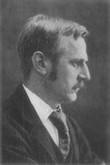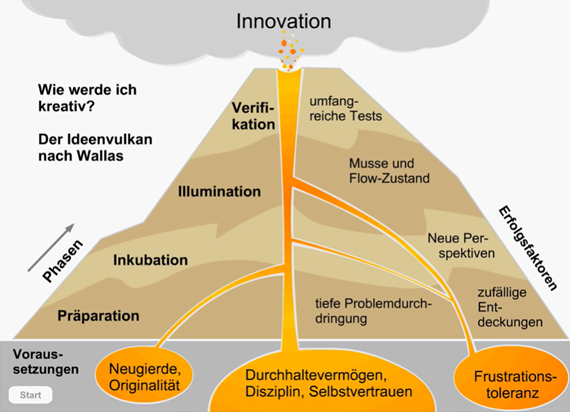
ART OF THOUGHT by Graham Wallas
Science: Social Psychology

The following is an adapted translation of a German Wikipedia entry on the phases of the creative process:
THE FOUR-PHASE MODEL
Wallas’ model traces its origins to observations by the German physiologist and physicist Hermann von Helmholtz (1884) and the French mathematician Henri Poincaré (1908). In The Art of Thought, Wallas combined these observations into a systematic theory of creative thinking. Today, the terms introduced by Wallas are considered to refer to the quintessential elements of human thought processes.
Stage of PREPAERATION: recognizing the problem as such
While the first phase was comprised of attuning to the problem, the second phase, the preparation phase, is about discovering. (Helmholtz and Poincaré had termed this phase the exploration or saturation phase.) It is here that information about the problem is discovered and collected. This resulting body of knowledge then serves as raw material for developing creative approaches to solutions.
The degree to which an individual or a group can be animated to creative achievements depends on the situation. The literature offers many examples in this regard. For example, some people can be effectively moved into this direction by performing actions as simple as reorganizing their desk, walking up and down a straight line, autogenic training, going jogging or doing dry skin brushing every morning. Doing eye training to harmonize the hemispheres of the brain or doing joyful exercises such as positive self-reinforcement by means of one’s encouraging inner voice are also recommended to stimulate an inspiring atmosphere.
Phase of INCUBATION: thinking you’ll never find a solution, and feeling lousy
From a medical point of view, the term incubation describes the time between infection and the outbreak of a disease. In a figurative sense, during this creativity phase, it isn’t the conscious mental struggle for and with raw material that dominates but rather a maturation process.
In order to allow this process to proceed undisturbed, the creative person consciously distances himself from the problem, negates it, and occupies himself with issues that seem to have nothing to do with the problem. This turning away can make it possible to break out of habitual thought patterns. During this phase, some artists report experiencing a regression from word to image, which then triggers creative impulses.
Helmut Schlicksupp recommends trusting one’s own unconscious creativity. Incubation, he says, is the phase in which the information accumulated during the first phase sinks into the subconscious and is then further processed in a suspended state.
Phase of ILLUMINATION: the eureka moment
The creative flash of insight is considered to be a sudden “illumination” or eureka moment. This phase is one of insight and includes the experience of “getting it right.” For example, a long-awaited solution may suddenly emerge from one’s own subconscious. Alternatively, a chance perception of an incidental detail or another person’s behavior may also trigger this experience.
VERIFICATION phase: feasibility and implementation
Most often, the solutions found do not yet comprise a complete solution to a problem. In the fourth phase, also called the design phase or elaboration phase, the approaches to finding solutions are systematically elaborated and the insights gained are verified as to their feasibility.
In many projects, this phase culminates in the presentation of an idea to a decision-making body. Helmut Schlicksupp points out that the more embryonic an idea is, the more vulnerable it is to criticism and doubt. Therefore, a detailed elaboration of the idea is important, giving precise information about its functions, benefits and value.
Some social scientists also include a fifth phase, the elaboration phase, referring to the elaboration of the idea. Poincaré’s model, for example, included five phases. That said, verification and elaboration are systematically interrelated, and Poincaré considered elaboration to be part of verification. In this respect, the limitation to four phases is quite justified.
Graham Wallas
(31 May 1858 – 9 August 1932) was an English socialist, social psychologist, educationalist, a leader of the Fabian Society and a co-founder of the London School of Economics.

